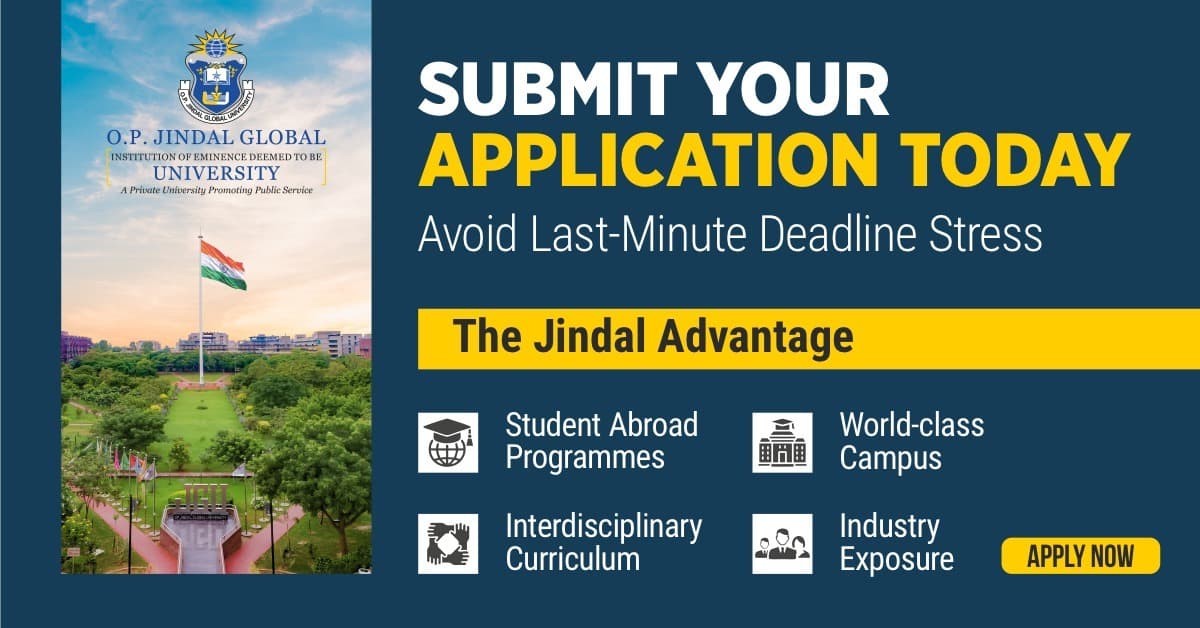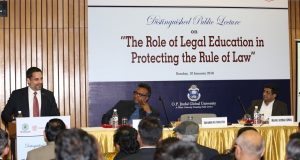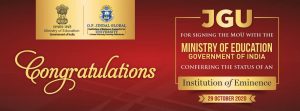Sonipat, April 20, 2016 – The Centre for Asia Pacific Security Studies and the Centre of India-China Studies at the O.P. Jindal Global University organised a Distinguished Lecture by Liu Jinsong, Acting Ambassador of China and Minister of Chinese embassy in India on “Prospects and Opportunities in Developing India – China Relations” at its Sonipat campus.
Delivering the lecture, Minister Liu reflected on the complexity and importance of the bilateral relations between India and China and emphasised that how these two neighbours interact would have maximum consequences for the new emerging multi-polar world order. He said that there are problems between the two counties but also numerous areas of ongoing cooperation.
Speaking on the impact of Prime Minister Narendra Modi’s visit to China and the impetus it has given to bilateral talks between the two countries, Minister Liu Jinsong said, “There are several high-level trips planned between the two countries, including the upcoming visits of the Indian National Security Advisor and Indian Defense Minster to China. One could not imagine that the two countries could have such deep, frequent and pragmatic talks on security and military cooperation. There have been very comprehensive discussions on a global anti-terrorism campaign, which has led to the setting up of a high level anti-terrorism mechanism between the two nations.”
On the issue of China placing a ‘technical hold’ at the UN on terrorist mastermind Masood Azhar, he said that the matter is not a bilateral one between China and India as it involved the citizen of a third country, and that China hopes that India and Pakistan can mutually agree to overcome the scourge of terrorism.
The minster referred to “the wisdom of Asian countries” and highlighted military-to-military engagements between India and China like the Kunming ‘hand-in-hand’ exercises and improvement in observation of protocols on the Line of Actual Control (LaC).
Speaking of the growing economic cooperation between India and China, Minister Liu gave the example of the Dalian Wanda Group which is investing 10 billion dollars in Haryana, the largest FDI from China. He emphasised that despite recent caste-based violence in Haryana, the CEO of the company did not hesitate because he saw India as a “great business opportunity”.
Minister Liu Jinsong spoke of sharing the Chinese economic and business models with India and said China was keen to set up projects and invest in Special Economic Zones (SEZs) in all major centres of India.
Speaking of India hosting the 8th Annual BRICS Summit this October in Goa, and of China hosting the G20 Summit, Minister Liu said that these two summits will be important for strategising on cooperation and that both sides need to support each other in agenda setting. The sustainable agenda, he said, would be one that would focus on e-commerce, terrorism and financial cooperation.
Talking of people-to-people contacts, Minister Liu highlighted that this has been encouraged a great deal with PM Modi offering e-visa for Chinese citizens, an original idea that has had an extremely positive impact. Last year more than 2 lakh Chinese visited India and this number can be increased manifold.
Minister Liu said that Sino-Indian relations were improving in the context of four global trends. First, the shift in gravity and centre of power from the West to the East. Second, increase in GDP of Asian countries, although their per capita incomes still remain low. Third, the role of people in international politics is increasing as understanding of human values spread. Fourth, the technological revolution is taking place.
Speaking of challenges, he proposed the construct of the 3 T’S, i.e. problems of Trust, Trade and Territory. On Trust, he said that China was suspicious of the USA’s interest in India and India was suspicious of China’s interest in its neighbours in the Indian Ocean and of China’s string of pearls strategy. He also spoke of the differences that the two countries had on the status of the Dalai Lama.
Speaking on increasing Sino-Indian trade, Minster Liu highlighted India’s trade deficit, high prices due to shipping costs in the absence of land-based connectivity, the problem of Chinese manufacturers and Indian retailers receiving low profits as some pressing issues needing solutions.
Speaking of China’s One Belt One Road (OBOR), he said that it was an important initiative for common infrastructural development and expressed hope that India may support the project or join at least some parts of it.
Welcoming Minister Liu Jinsong to Jindal University, Dr. Sreeram Chaulia, Dean of the Jindal School of International Affairs pointed out that it would not be an exaggeration to state that the India-China relationship is the defining one in the 21stcentury. He said that managing this relationship holds the key to not just peace, prosperity and stability in Asia but throughout the world.
The event was attended by Chinese diplomats, Professor R Sudarshan, Dean of the Jindal School of Government and Public Policy, Professor Gudmundur Eiriksson of the Jindal Global Law School, and Professor Wenjuan Zhang, Executive Director-Centre for India-China Studies.




